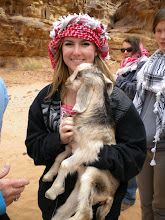
Ibrahim told me that at first not many people from the villages took advantage of the service they were providing, but as soon as word spread about a few successful cases everyone was lining up to seek help. We went in the afternoon not only because we had been busy all day, but more importantly because it was significantly cooler outside than in the middle of the day. Around noontime in the desert is brutal, as you can imagine.
We arrived at the first village, Arb El Sharwareh, and were met by a woman known as Im Osama. "Imme" means 'my mother' ("Immek" is 'your mother' to a female, "Immak" your mother to a male); older women are usually refered to as "Im (insert oldest child's name)". At Tata Huda's senior citizens' center everyone calls her Im Jiries. The same goes for men but instead of Im it is Abu. Im Osama greeted us outside of her house and told us her husband would be home soon. She took an immediate liking to me and insisted on giving me coffee, tea, and cookies and showing me around her house. Later on she even gave me a bag of cookies to take home with me. Like all the Palestinian people I have ever met, she showed extraordinary hospitality towards me even though my visit was unexpected. It also never fails to amaze me how nice the people here are to me despite the fact that I come from a country which is literally funding the occupation that makes their lives difficult and causes perpetual fear.
After coffee and a few cups of tea, I went back outside and was surprised to see that lots of children and men had gathered with donkeys and horses. They watched as Dr. Yousef unpacked his medicine case, and then he gave some of the donkeys shots. It wasn't easy; many of the donkeys kicked and reared when the doctor came near them. He also checked out a few horses that were having problems and they were even more difficult than the donkeys because of their sheer size. I have never seen such large horses- they have exceptionally huge muscles from working all the time. Abu Osama got home and helped the doctor out and then he traveled with us to a few other locations.









Dr. Yousef gave out medicine so that the donkey owners can continue treatment throughout the week until the doctor returns for a followup.

We hopped in Ibrahim's truck and headed to another location. While Ibrahim and Dr. Yousef checked out the animals with some of the men from the village, I introduced myself to the women and children of a family who were sitting in front of a home, giggling and staring at me. They insisted on giving me a large cup of tea, even though I told them I already had drank about 5 cups that day. Everyone had a good laugh as they went around the room saying their named and I repeated them back, butchering the pronunciation. I told them a little bit about myself and we chatted about school and Ramadan (the Muslims fasting month that begins today). The kids crowded around me and the older women sat on the other side of the room and whispered. It was a really fun and wonderful experience; I got to practice my Arabic and the young girls practiced the English they had learned so far in school, and they showed me lots of pictures of their family.

Ibrahim had given many of the animals the nose cover that I mentioned in a previous entry, which prevents the bridle from cutting the front of their snout. Some of the animals still needed one though, like this horse:


After the doctor was finished checking out the animals, the family elder played an old traditional Arabic intrument, the rababa, for us as a token of their appreciation. The rababa has to be heated up in the fire in order to work properly, so we waited a few minutes before he began. The whole family crowded in a small room of the house to listen. He sang and played the rababa for almost 15 minutes for us; Ibrahim told me that he sang about the land and the rich history of his people. It was very beautiful and we felt very honored to listen to him play.



Since today marks the beginning of Ramadan, the Muslim fasting month, the Palestinian Authority set back the clocks by an hour (like Daylight Savings). During Ramadan the Muslims can only eat and drink before 5 am and after 5 pm. The downside to this is that Israel is now an hour ahead of us, which is really confusing.
On a different note, Shorok's older sister Rawan gave birth to twin girls yesterday!!! I am going to write about it and include pictures after we go visit her later, but for now Jiries and I are going into Jerusalem to meet with Maya, the young Israeli girl who will be speaking at the Tree of Life Conference in November. She wants to meet around 4:30, which is 3:30 our time (ughhh makes planning frustrating). I can't believe how many unbelievable things I have done in such a short amount of time, and I still feel like I have a million things to do. I have the PWLS to thank for my most recent adventures, and Jiries to thank for setting me up as a volunteer there. More to come later!


No comments:
Post a Comment